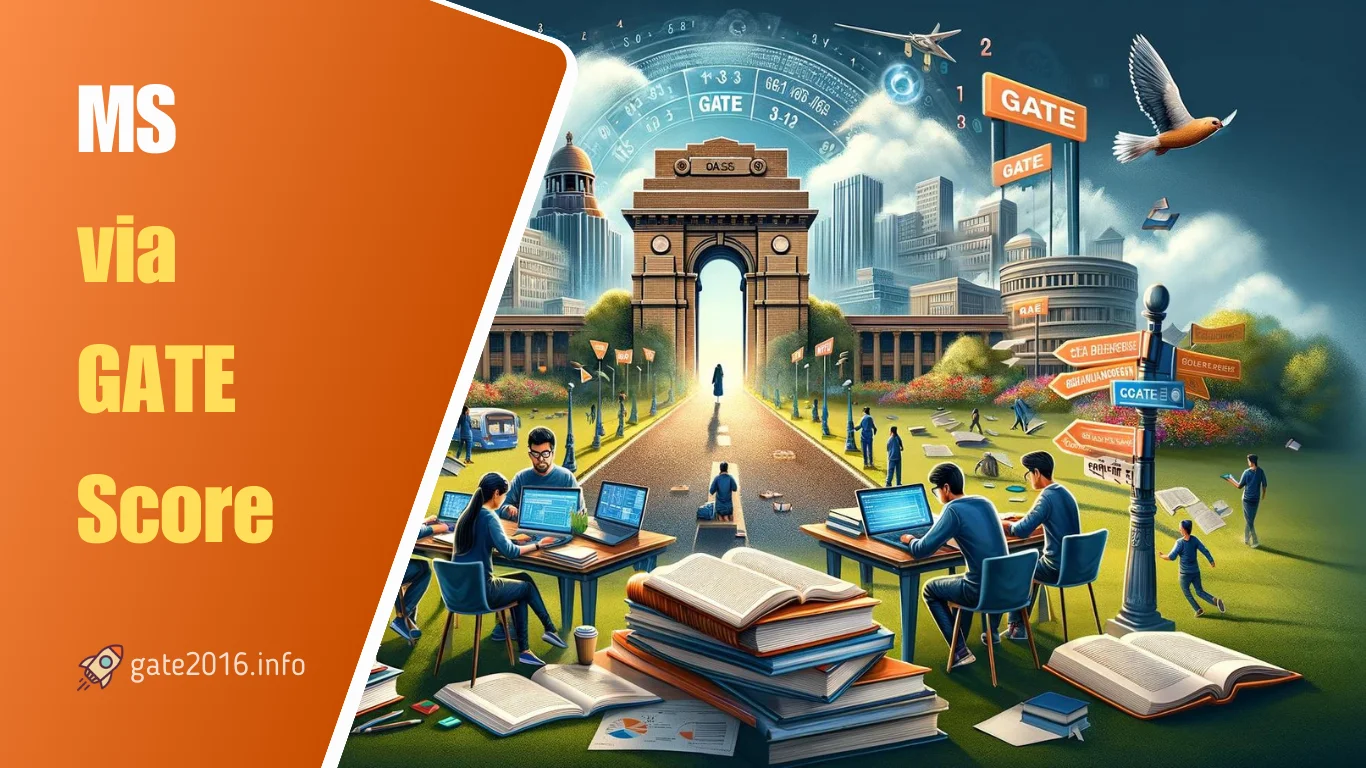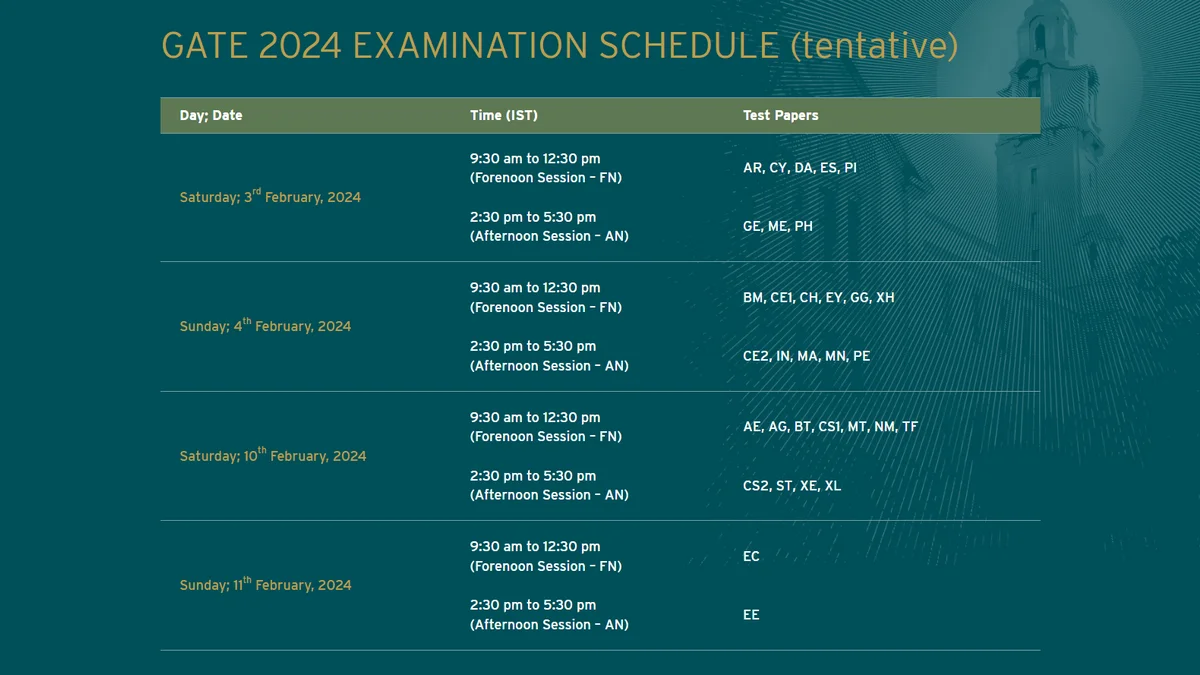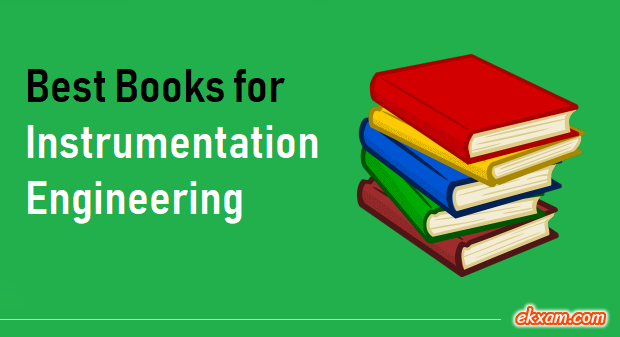Advertisements
Ratings
GATE BT Syllabus 2024 – GATE 2025 exam will be conduct by IIT, Roorkee on dates 1, 2 and 8, 9 February, 2025. Here we have provided latest Biotechnology syllabus & paper pattern for GATE 2024 aspirants.
All candidates with Biotechnology subject are advised to download this latest syllabus before starting their GATE 2024 exam preparation.
Contents
- GATE 2025 Highlights
- GATE Biotechnology Paper Pattern 2024
- GATE Biotechnology Engineering Exam Pattern Details 2024
- GATE Biotechnology Syllabus 2024 PDF
- GATE Biotechnology Syllabus for General Aptitude 2024
- GATE Biotechnology Syllabus for Engineering Mathematics 2024
- GATE Biotechnology Syllabus for Core Subjects 2024
- GATE Biotechnology Syllabus Weightage 2024
- GATE Biotechnology Engineering Guidance
- GATE Biotechnology Syllabus & Exam Pattern FAQs
- Related Links
- GATE Total Information & Guidance
GATE 2025 Highlights
| GATE 2025 Conducting Body | IIT, Roorkee |
| GATE 2025 Exam Date | 1, 2, 8, 9 February, 2025 |
| GATE 2025 Total Subjects | 30 |
| GATE 2025 Exam Mode | ONLINE Computer Based Test (CBT) |
| GATE 2025 Exam Duration | 3 hours (180 minutes) |
| GATE 2025 Total Questions | 10 (GA) + 55 (subject)= 65 |
| GATE 2025 Total Marks | 100 |
| GATE 2025 Question Type | MCQ, MSQ, NAT |
GATE Biotechnology Paper Pattern 2024
| Paper Sections | Marks Distribution |
|---|---|
| Subject Questions | 72% of the total marks. |
| Engineering Mathemetics | 13% of the total marks. |
| General Aptitude | 15% of the total marks. |
GATE Biotechnology Engineering Exam Pattern Details 2024
| Particulars | Details |
| Mode of Exam | Online |
| Number of Questions | 65 |
| Duration of Exam | 3 hours |
| Pattern of Questions |
|
| Marking Scheme |
|
| Number of Sections |
|
| Topic wise weightage |
|
GATE Biotechnology Syllabus 2024 PDF
| General Aptitude Syllabus (Common to all papers) [pdf] | Download |
| GATE Syllabus for Biotechnology (BT) [pdf] | Download |
GATE Biotechnology Syllabus for General Aptitude 2024
| Topics | Syllabus |
| Verbal Aptitude |
|
| Quantitative Aptitude |
|
| Analytical Aptitude |
|
| Spatial Aptitude |
|
GATE Biotechnology Syllabus for Engineering Mathematics 2024
| Topic | Subtopics |
| Linear Algebra |
|
| Calculus |
|
| Differential Equations |
|
| Probability and Statistics |
|
| Numerical Methods |
|
GATE Biotechnology Syllabus for Core Subjects 2024
| Subject | Topics | Subtopics |
| General Biotechnology | Biochemistry |
|
| Microbiology |
| |
| Immunology |
| |
| Recombinant DNA Technology and Other Tools in Biotechnology | Recombinant DNA Technology |
|
| Molecular tools |
| |
| Analytical tools |
| |
| Computational tools |
| |
| Genetics and Cellular Biology | Genetics and Evolutionary Biology: |
|
| Cell Biology |
| |
| Molecular Biology |
| |
| Fundamentals of Biological Engineering | Engineering Principles applied to biological systems |
|
| Classical thermodynamics and Bioenergetics |
| |
| Transport Processes |
| |
| Bioprocess Engineering and Process Biotechnology Syllabus | Bioreaction Engineering |
|
| Upstream and Downstream Processing |
| |
| Instrumentation and Process Control |
| |
| Plant, Animal, and Microbial Biotechnology Syllabus | Plants |
|
| Animals |
| |
| — | Microbes |
|
GATE Biotechnology Syllabus Weightage 2024
| Important Topics | Expected Marks/ Weightage |
| General Aptitude | 10 |
| Engineering Mathematics | 10-15 |
| Plant and Animal Biotechnology | 15-20 |
| Bioprocess Engineering | 10-15 |
| General Biotechnology | 20-25 |
GATE Biotechnology Engineering Guidance
- How to Prepare for GATE Biotechnology: A Comprehensive Guide
- GATE 2025 Books: Biotechnology
- GATE BT Syllabus 2025: Biotechnology
- GATE BT Previous Year Solved Papers – (2023-2010)
GATE Biotechnology Syllabus & Exam Pattern FAQs
What is the GATE Biotechnology exam?
The Graduate Aptitude Test in Engineering (GATE) Biotechnology exam is a national-level entrance exam conducted for admission to postgraduate programs in Biotechnology and related fields at various institutes across India.
What is the syllabus for GATE Biotechnology?
The GATE Biotechnology syllabus covers various topics such as Microbiology, Biochemistry, Molecular Biology and Genetics, Process Biotechnology, Bioprocess Engineering, Plant and Animal Biotechnology, etc.
You can check the official website of GATE for a detailed syllabus.
What is the exam pattern for GATE Biotechnology?
The GATE Biotechnology exam is a computer-based test that consists of 65 questions worth a total of 100 marks.
The paper has two types of questions - multiple-choice questions (MCQs) and numerical answer type (NAT) questions. The duration of the exam is 3 hours.
How should I prepare for GATE Biotechnology?
To prepare for GATE Biotechnology, you should follow a structured study plan, make notes, and practice solving previous year question papers and mock tests.
You should also refer to standard textbooks and study materials, attend online courses, and seek guidance from experts or mentors.
What are the best books for GATE Biotechnology preparation?
Some of the best books for GATE Biotechnology preparation are:
- Biotechnology - Satyanarayana
- Molecular Biology of the Cell - Bruce Alberts
- Lehninger Principles of Biochemistry - David L. Nelson and Michael M. Cox
- Principles of Genetics - Gardner, Simmons, Snustad
- Biochemical Engineering - James M. Lee
Is there any negative marking in the GATE Biotechnology exam?
Yes, there is negative marking in the GATE Biotechnology exam for MCQs. For every incorrect answer to 1-mark questions, 1/3 mark will be deducted, and for every incorrect answer to 2-mark questions, 2/3 mark will be deducted.
Can I use a calculator during the GATE Biotechnology exam?
Yes, a virtual calculator will be provided on the computer screen during the GATE Biotechnology exam.
How is the GATE Biotechnology exam score calculated?
The GATE Biotechnology exam score is calculated on the basis of the number of correct answers and incorrect answers.
For MCQs, 1 or 2 marks are awarded for a correct answer, and 1/3 or 2/3 marks are deducted for an incorrect answer.
For NAT questions, 1 or 2 marks are awarded for a correct answer, and there is no negative marking for incorrect answers.
What is the qualifying cutoff for the GATE Biotechnology exam?
The qualifying cutoff for the GATE Biotechnology exam varies from year to year and is decided by the exam conducting authority.
Generally, the cutoff for General category candidates is around 25-30 marks out of 100, and for SC/ST/OBC/PwD candidates, it is around 20-25 marks out of 100.
What are the benefits of qualifying GATE Biotechnology?
Qualifying GATE Biotechnology opens up various opportunities such as admission to postgraduate programs in Biotechnology, scholarships, fellowships, and job opportunities in the public and private sectors.
GATE scores are also accepted by some foreign universities for admission to their postgraduate programs.
Related Links
- GATE 2025 Books: Biotechnology
- GATE BT Syllabus 2025: Biotechnology
- GATE BT Previous Year Solved Papers – (2023-2010)
Recent Posts
- AAI Through GATE 2024 – JE (Junior Executive)
- M Tech and MS Programs Through GATE and GRE: Navigating Postgraduate Options
- Job Opportunities After GATE 2024 in India: What You Didn’t Know!
- BSPHCL Through GATE 2024 – 40 AEE
Related Tags
Gate bt syllabus pdf free download 2025, Gate bt syllabus 2025, gate bt syllabus iisc 2025, gate bt exam date 2025, gate bt syllabus pdf 2025, gate bt syllabus pdf 2025, gate biotechnology syllabus 2025, gate biotechnology 2025
| GATE (Reasoning & Aptitude & Maths) Books |
| GATE Guide Books |
GATE Total Information & Guidance
Click below given links to get further information.







excellent work………………….thank you soo much for precise and efficient knowledge.
Thanks monisa for appreciating our work.